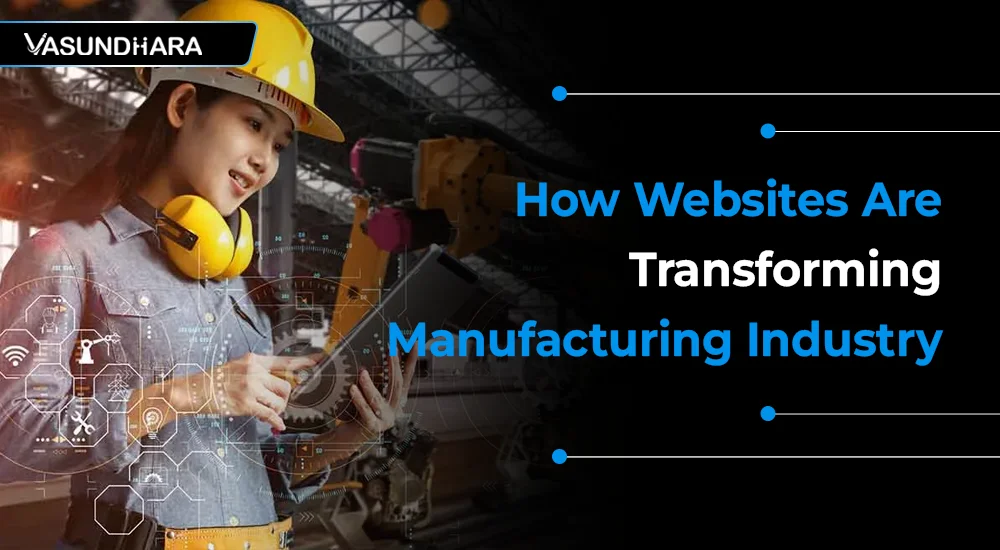How Websites Are Transforming Manufacturing Industry


- Jan 18, 2024



The manufacturing industry, the backbone of economies, has witnessed substantial changes over the years.
Websites, once considered optional, have become indispensable tools for manufacturers seeking to thrive in the digital age.
As a leading custom website development company, Vasundhara Infotech specializes in providing manufacturing website development services and digital transformation services.
This blog explores a recent and transformative aspect of this evolution – the role of websites in reshaping the manufacturing landscape.
Traditional manufacturing has long been characterized by manual processes, physical labor, and hierarchical structures.
Despite the efficiency of traditional methods, several challenges have persisted.
These include limited flexibility, high production costs, and slower response times to market changes. The need for a more adaptive and dynamic approach has become evident.
Innovation is the lifeblood of any industry, and manufacturing is no exception. The sector must embrace innovation to address the challenges posed by traditional methods.
Also read: Tailored Website design for Manufacturing Companies
Despite the historical success of traditional manufacturing, industrial manufacturing companies face several inherent challenges as the following:
Traditional manufacturing processes were designed for mass production of identical products.
Any deviation from the standard design or specification required significant retooling and adjustments, making it difficult to adapt to changing customer demands or market trends.
The reliance on manual labor, coupled with the need for extensive physical infrastructure, contributed to high production costs.
Expensive machinery, large factory spaces, and a labor-intensive workforce all affected traditional manufacturing's overall cost-effectiveness.
The hierarchical nature of traditional manufacturing often led to slow decision-making processes.
Adapting to market changes, introducing new products, or addressing production issues required time-consuming communication and approval procedures.
Traditional manufacturing processes were not optimized for resource efficiency.
Excess material waste, energy consumption, and inefficiencies in supply chain management were common issues that impacted both the economic and environmental sustainability of the manufacturing sector.
As a premier manufacturing website design company, we at Vasundhara Infotech can help you navigate challenges faced by traditional manufacturing methods
https://vasundhara.io/blogs/manufacturing-website-design-company
Digital transformation refers to the integration of digital technologies into all aspects of a business, fundamentally changing how it operates and delivers value to customers.
In manufacturing, this entails leveraging cutting-edge technologies to enhance efficiency, reduce costs, and improve overall performance.
In manufacturing, IoT devices are revolutionizing operations by providing real-time insights into production processes, equipment performance, and supply chain management.
These technologies are capable of analyzing vast amounts of data to make informed decisions and improve overall efficiency.
Big Data analytics allows manufacturers to derive meaningful insights from this data, enabling informed decision-making and strategic planning.
In manufacturing, this technology streamlines collaboration, data management, and accessibility, paving the way for a more agile and responsive industry.
Also read: 7 Must-Have Features for Manufacturing Websites
The role of websites in manufacturing transformation extends far beyond being digital placeholders.
They are dynamic platforms that leverage technology to optimize various aspects of the business, from marketing and sales to customer engagement and support.
Establishing an online presence is crucial for manufacturers to remain competitive. A website serves as a digital storefront, offering visibility, credibility, and accessibility to a global audience.
Websites allow manufacturers to showcase their products, capabilities, and expertise.
Rich multimedia content, such as videos and virtual tours, provides potential clients with a comprehensive understanding of the manufacturing processes and the quality of products.
Web development has led to a significant shift in consumer behavior, with an increasing preference for online transactions.
Manufacturers are adapting to this trend by incorporating e-commerce capabilities into their websites, enabling direct sales and improving supply chain efficiency.
Selling products online offers manufacturers numerous advantages, including increased market reach, reduced distribution costs, and enhanced customer convenience.
E-commerce integration also allows for personalized customer experiences and data-driven decision-making.
Websites serve as platforms for manufacturers to engage with their audience.
From social media integration to interactive features, manufacturers can build and nurture relationships with customers, suppliers, and partners.
Websites function as a 24/7 customer support channel, providing information, troubleshooting guides, and contact options.
This enhances customer satisfaction and fosters a sense of reliability and transparency.
Also read: Expert Manufacturing Website Design Company- Vasundhara Infotech
Numerous manufacturing companies have successfully embraced digital transformation through their websites, leveraging technology to enhance efficiency, expand market reach, and foster innovation.
This section highlights specific examples of companies that have stood out in their transformative journey.
Siemens, a multinational manufacturing and electronics company, embraced digitalization through its IoT operating system, MindSphere.
Siemens utilized its website to introduce MindSphere to the market, providing detailed information, case studies, and resources.
The platform enables manufacturers to connect their machines and physical infrastructure to the digital world, facilitating data-driven decision-making and predictive maintenance.
Boeing, a leading aerospace manufacturer, utilized its website to showcase advancements in manufacturing techniques.
From additive manufacturing (3D printing) to robotic automation, Boeing's website offers insights into how these technologies are revolutionizing aircraft production.
Tesla, the electric car manufacturer, transformed the automotive industry by adopting a direct-to-consumer sales model.
Tesla's website is central to this strategy, allowing customers to configure and order vehicles online.
The website is a key component of Tesla's business model, enabling the company to disrupt traditional automotive sales channels and build a global customer base.
As technology continues to advance, new trends will shape the future of website transformation in manufacturing.
Future trends in manufacturing websites include 3D printing integration for personalized product visualization, blockchain enhancing supply chain transparency, augmented reality for immersive product experiences, advanced analytics and AI-driven insights for demand forecasting, and Robotics as a Service (RaaS) via web platforms.
Additionally, there will be increased emphasis on sustainability, integration of IoT in marketing strategies, enhanced cybersecurity for online transactions, improved virtual collaboration platforms, and AI-driven chatbots for intelligent customer support.
Also read: Customized Web Solutions For Quality Control In Manufacturing
The manufacturing industry is poised for a new era, and manufacturers are encouraged to embrace digital transformation by adopting advanced websites.
The benefits are operational and extend to customer relationships, market reach, and overall competitiveness.
Partnering with the top website development company is essential for manufacturers looking to embark on their digital transformation journey.
Vasundhara Infotech, with its expertise in web development and digital marketing solutions, stands ready to assist manufacturers in creating tailored websites that align with their goals and industry requirements.
The journey towards a digitally transformed manufacturing industry begins with a click. Request for a quote now!
Contact Vasundhara Infotech today to explore how our innovative website solutions can elevate your manufacturing business to new heights.
Copyright © 2026 Vasundhara Infotech. All Rights Reserved.